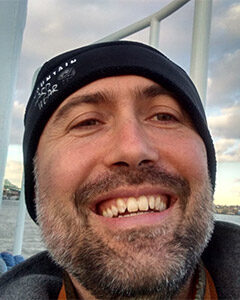
Garo Saraydarian teaches in both the Master of Music in Music Education program and the Composition and Theory Department at Longy. His research interests include marginalized pedagogical practices in education, descriptive inquiry, critical theory, digital humanities, pedagogies of place, Carnatic music, and the oud. Garo is currently working on several projects including computational analysis of makams in late-Ottoman printed music, an archive of Armenian folk music printed in post-genocide Beirut and Soviet Armenia, a solfege based web application for dictation skills, and the “Musician of the Month Project” which aims to have more inclusive representation of musicians in public schools.
Garo has published in Jazz Education for Research and Practice and is currently finishing a co-authored book on narrative writing in research which will be published by Teachers College Press. He is also a jazz trombonist and performs regularly with the Boston-based Ayn Inserto Jazz Orchestra.
In addition to Longy, Garo is a lecturer at MIT where he teaches musicianship and aural skills. He is also a preK-5 elementary general music (vocal and instrumental) public school teacher in Massachusetts. Garo holds standard certification in the Kodaly Method and Level I Orff certification.
B.A., University of California, Riverside (Music); M.M., Berklee College of Music/Boston Conservatory (Jazz Performance); ABD, Lesley University (Educational Studies).
Teaching Philosophy
Much of my work is based on the importance of epistemological diversity, the valuing of multiple ways of knowing and being. I see the classroom as a place where knowledge is co-created and explored and where the perspectives and experiences that students bring to the classroom are acknowledged as valid sources of knowledge and insight. Teaching is a political act that, struggling against the privatization of the commons, advocates for diversity, human(e)-ity, justice, and affirmation. As such, I believe that the recurring call in our public discourse for data-driven instruction is really a data-distorted view of education characterized by an obsession with quantitative testing, a pathological and hypercompetitive “race to nowhere,” and an overemphasis on impoverished definitions of numeracy and literacy. By contrast, good teaching is inherently socially just teaching in that it meets human learners where they are at, honors difference, sits with ambiguity, and co-creates space for what Paulo Freire calls conscientização in both ‘teacher’ and ‘student’.
